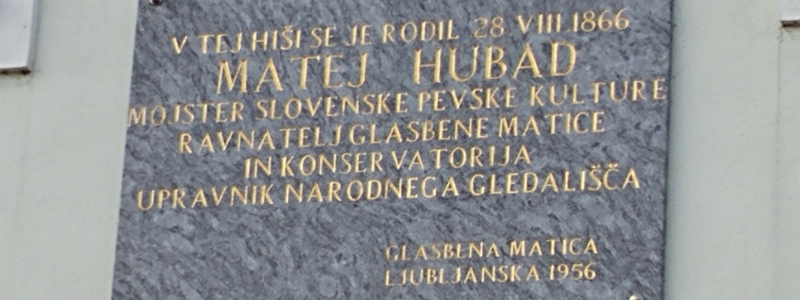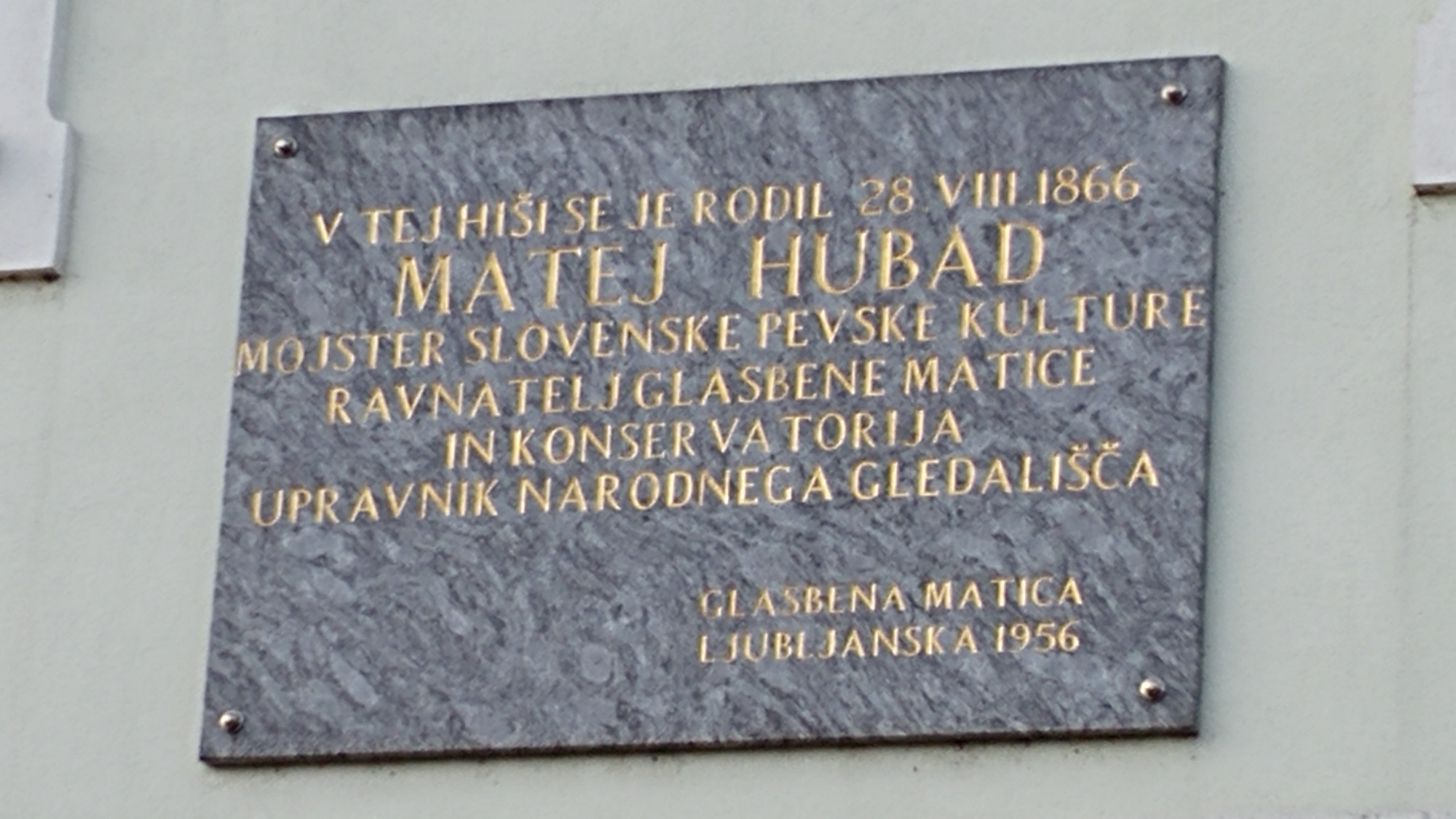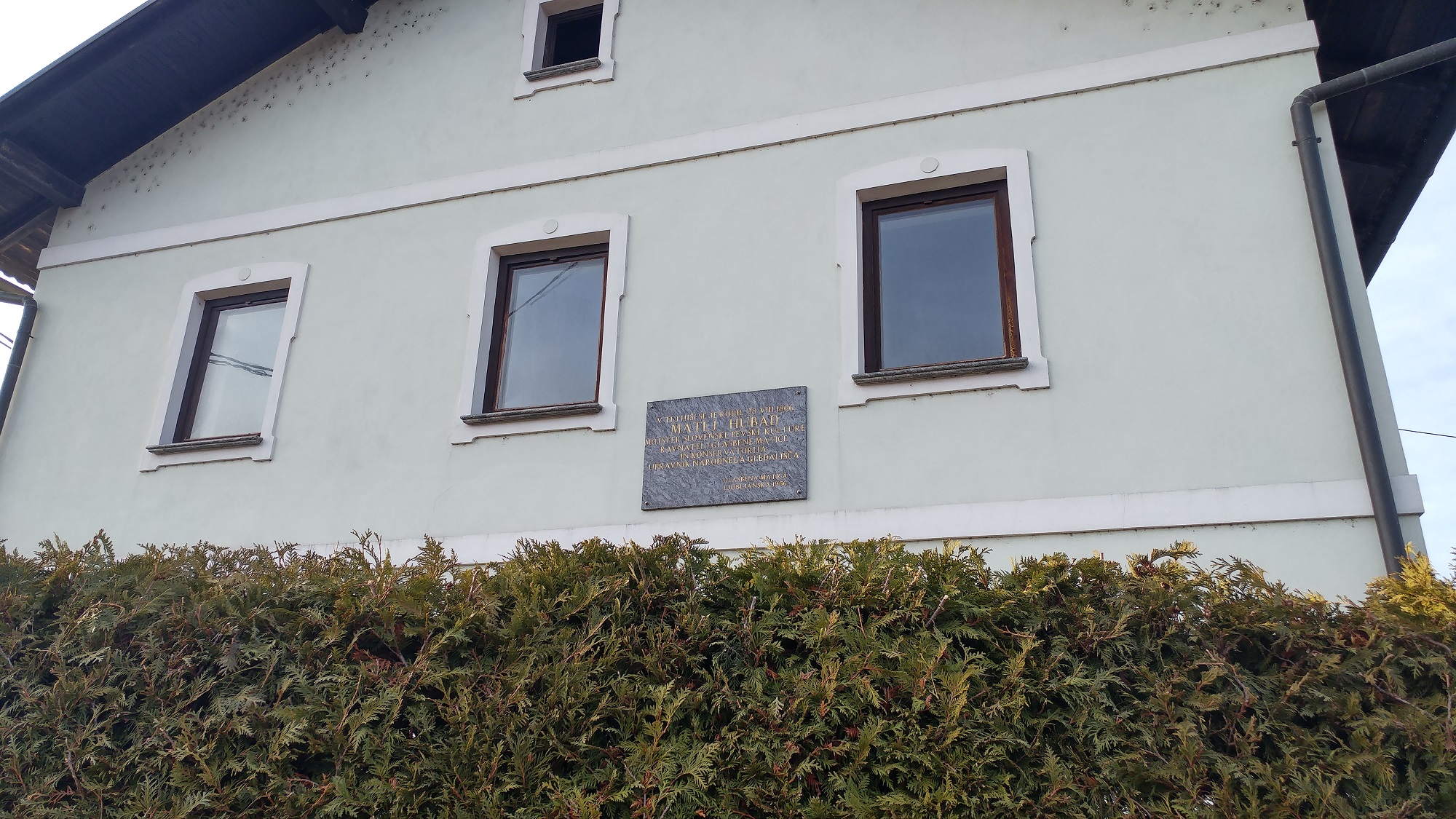In Povodje near Skaručna, a rectangular granite plaque bearing an inscription was affixed to the house where Matej Hubad was born. While the plaque is visible from the main street, public access is not available, as the building is situated on the private land of the current owners of the farm. The plaque was put up in 1956 by the Music School of the Glasbena matica Musical Society Ljubljana in honour of its principal.
Matej Hubad
An important figure of the Slovenian national revival, Matej Hubad (1866–1937) was a prominent singing teacher, choirmaster, singer, pianist and organist, as well as director of some of the major Slovenian music institutions and societies, including the Glasbena matica Music Society and the National Theatre’s Opera House. He made his greatest impact on the development of music through his activity as the principal of the Glasbena matica Music Society in Ljubljana, which developed into a conservatory during Hubad’s 21-year tenure. Hubad built up a varied concert repertoire and sustained high standards of performance delivery, and primarily focused on leading the Musical Society’s Choir, which performed in Vienna, Zagreb and Trieste among other cities. Regarded as the doyen of Slovenian choral singing, Hubad also influenced the development of vocal practice in several Slovene choral societies that emerged in Ljubljana and Vienna after 1860.
After graduating from secondary school, Matej Hubad, who was born in Povodje near Skaručna, pursued law studies in Graz, but gave this up after a year in favour of a musical education. At the Vienna conservatory, he studied harmony and counterpoint with the celebrated composer Anton Bruckner, organ with Josef Vockner, and majored in solo singing with Filip Forstén. During his studies, he also engaged in choral conducting and led the choir of the Slavic Choral Society in Vienna.
At the invitation of the Glasbena matica Music Society, Hubad moved to Ljubljana, and taught piano, vocal studies, music theory, harmony, counterpoint and music history at the Society’s Music School between 1891–1896. It was during this period that he served as the choirmaster and, responsible for its concert repertoire, music director of the Music Society’s Choir.
On sabbatical, Hubad travelled across Europe, visiting Prague, Munich, Dresden, Leipzig, Berlin, Warsaw and Krakow with the aim of familiarising himself with their music institutions, theatres, conservatories and music schools. In autumn 1898, he returned to Ljubljana to play an active role at the Glasbena matica Music Society, whose basic school developed to provide secondary instruction in music. With a view to enhancing the concert repertoire, he arranged selected secular and sacred melodies, which were published in various collections by the Glasbena matica Society. In 1902, Hubad wrote a textbook on music theory to meet the educational requirements of the music school. In 1917, after the death of his predecessor, Fran Gerbič, he took over as the principal of the Glasbena matica Music School, at the helm of which he ardently advocated the establishment of the Music Society’s Conservatory of Music and Drama, which came into existence in 1919 – the first institution of its kind in Slovenia.
As a dedicated singing teacher, Hubad played an influential role in the vocal development of a number of Slovenian singers, including soloists as renowned and widely recognised as Mira Dev-Costaperaria, Pavla Lovše, Irma Polak, Josip Rijavec, Leopold Kovač, Ivan Levar, and Julij Betetto, who joined the ensemble of the Vienna Court Opera.
As a committed proponent of the engaged delivery of artistically relevant music, Hubad markedly influenced Slovenian orchestral practice. The Slovenian Philharmonic was founded in Ljubljana in 1908; on Hubard’s initiative, the orchestra members included musicians from Prague and Vienna. In addition to choral pieces for the Matica Music Society’s concerts – Gallus’ choral works, Veseli pastir (Merry Shepherd) by Nedvěd, Ljubica (Sweetheart) by Foerster, Gondoljerjeva pesem (Gondolier’s Song) by Gerbič – Hubad also programmed Slovenian and (contemporary) international vocal-instrumental works, including Psalm 149 by Dvořak, Missa solemnis by Beethoven, The Creation by Haydn, Verdi’s and Mozart’s requiems, and The Assumption, an oratorio by Hugolin Sattner.
The vocal brilliance of Hubad’s massive choir of 150 singers was showered with much praise in Vienna and spurred the development of the Slavic Choral Society. According to Slovenski narod, a Viennese publication (for Slovenian readers), “It would have been a national shame if we had been surpassed in artistic perfection right in the heart of Slovenia.”
Hubad was also editor-in-chief of the Music Society’s publications. Although not a composer, he proficiently adapted (harmonised) numerous works in the liturgical and folk music repertoire and paved the way for these compositions to be performed publicly. His arrangements of Slovenian church and national songs were published in 1900 in volume XXXI of the Music Society’s editions of the collections Slovenian Spirituals from the 16th and 17th Centuries and Slovenian National Songs. In 1905, Hubad became a member of the Slovenian Committee for the Collection of Folk Songs, and drew up guidelines on collecting folk songs.
Apart from his role in the development of Slovenian musical life, which proved instrumental in broadening the musical horizons of audiences as well as performers, Hubad is recognised for his seminal contribution to Slovenian music production, periodicals, etc.
Maia Juvanc


